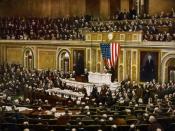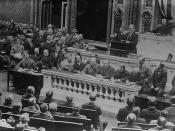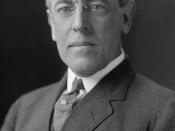From 1877 to 1914 the United States truly underwent drastic changes. The civil war being over, the US could finally consider itself to be a united country and with the industrial revolution bringing along new technologies to the advancement of society as a whole, America was a country full of opportunities for its people. Superficially, this might seem to be the case, but unfortunately though, a wealthy minority used these developments to their sole advantage and by establishing huge monopolies, they exploited the lower class, causing social problems, and used their power to influence the government. When naming the period from 1877 to 1914 "The Gilded Age", with gilded meaning covered with gold or deceptively attractive, Mark Twain was totally accurate since at the first glance this period seemed to be perfect and ideal, but at a closer look it becomes clear that the golden coin of the age was only golden on the side of the middle and upper class members, while on the side of the poor lower class, the coin was merely made of bronze, so that with the progressive spirit towards improvement, reformers made an attempt to close this gap between the rich and the poor, further better government and society through their reform movement and make this a truly "gilded age" for all Americans.
With the help of the industrial revolution, the American industry could make use of the new technologies. Contributing to this development was the spreading of railroads and the emergence of oil and cheap steel. Moreover, widespread applications were found for the telephone and electricity. But still, all these advances mainly served the wealthy upper-class. Thus, tycoons like Carnegie, Rockefeller and JP Morgan emerged, who monopolized certain industries and exploited the poor labor force, arguing that now the common people could "obtain...


